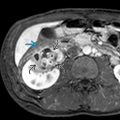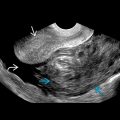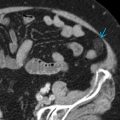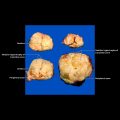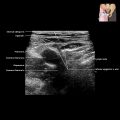KEY FACTS
Terminology
- •
Hemodynamically significant narrowing of renal artery (RA)
Imaging
- •
Poststenotic “jet” and turbulent flow on color Doppler
- ○
Abnormally high peak systolic velocity with angle-corrected spectral Doppler in main RA immediately distal to stenosis
- ○
Peak systolic velocity in and immediately distal to stenosis ≥ 180-200 cm/s
- ○
- •
Diminished downstream systolic peaks
- ○
Abnormally low peak systolic velocity in arcuate arteries with diminished resistive indices
- ○
Tardus et parvus waveform shape
- –
Low resistive index < 0.5 due to dampened systolic peaks and normal diastolic flow
- –
Acceleration time (time to peak systole) > 0.07 s
- –
Acceleration index < 3 m/s²
- –
- ○
These downstream effects are very different from poststenotic high-velocity jet
- ○
- •
Ultrasound may be used for screening, followed by contrast-enhanced MRA or CTA
- •
DSA may be needed for accurate fibromuscular dysplasia diagnosis in distal RA, hilar branches due to higher spatial resolution
Pathology
- •
Atherosclerosis: Ostium or proximal 2 cm of RA
- •
Fibromuscular dysplasia: Mid or distal main RA
- •
Aortic dissection or aneurysm (RA compression)
- •
Thromboembolism
- •
Other vasculitides
- •
Retroperitoneal fibrosis
- •
Trauma with RA dissection
Scanning Tips
- •
Scanning in decubitus or oblique position in coronal plane through posterior axillary line will allow improved Doppler evaluation of segmental arteries
- •
Evaluation of RA ostium can be best achieved via epigastric window; use superior mesenteric artery or renal vein as landmarks; if this window is obscured by bowel gas, left lateral decubitus position with probe in sagittal orientation from below ribs may be used
- •
Right RA can be seen arising from aorta via longitudinal transhepatic view; by angling probe, both RAs can be seen arising from aorta in this view, creating “banana peel” view, which demonstrates both RA origins in 1 image


